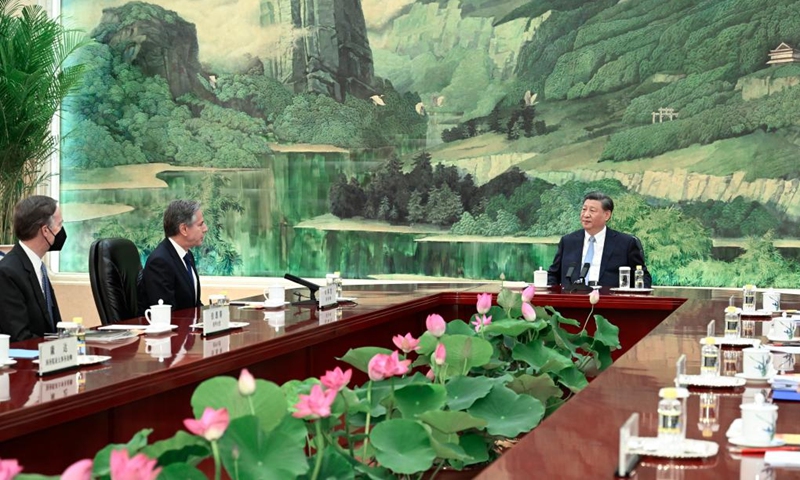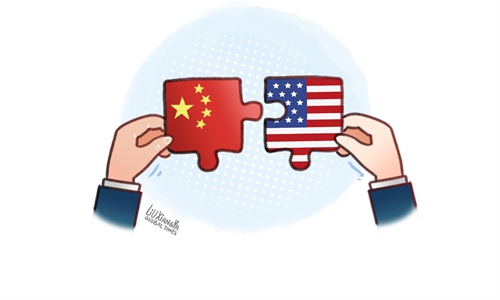
Chinese President Xi Jinping meets with visiting U.S. Secretary of State Antony Blinken in Beijing, capital of China, June 19, 2023. (Photo:Xinhua)
The long-delayed trip of US Secretary of State Antony Blinken to Beijing is the first of its kind in five years, making him the most senior US official to visit China since President Joe Biden took office. The "candid, in-depth and constructive" talk between the two major powers is a necessary step to unlock future engagement but still insufficient to halt the downward spiraling China-US ties.
No red carpets, only the red line
Instead of being greeted by red carpets and flowers, Blinken arrived in Beijing for talks on some most vexing issues between China and the US. These issues range from managing differences to enhancing exchanges, from flights connection to the Taiwan question. China made it clear that the US should "adopt an objective and rational perception of China" and the principles of mutual respect, peaceful coexistence and win-win cooperation put forward by President Xi Jinping should be "the spirit jointly upheld, the red line jointly defended and the goal jointly pursued by both sides."
During the high-stakes talks, the two sides agreed to maintain high-level interactions, including scheduling a future visit to the US by Chinese State Councilor and Foreign Minister Qin Gang, advance consultations on specific issues through the joint working group and encourage people-to-people and educational exchanges. These deliverables could serve as incremental improvements to bilateral ties but they still do not have the potential to make a fundamental difference. Why is that? The US side knows the reason very well.
Those that vow the most are the least sincere
Blinken made the visit against the background of China-US relationship reaching "the lowest point since its establishment" and "the responsibility for this situation is clear," as stated in the Chinese press release following Blinken's call with his counterpart, Qin, prior to the former's trip to China.
Needless to say, the China-US relationship remains mired in distrust and hostility starting from early this year. Blinken's visit had been originally planned to take place in February but scrapped as the US shot down a Chinese meteorological airship and insisted on calling it a "spy balloon." Following the ridiculous "balloon saga," Blinken's rescheduled visit was again marred by the disinformation campaign hyping up the so-called Chinese spy base in Cuba. Is it only a coincidence that there must be some surprises before each interaction, or is this only a leverage of the US side to exert pressure on its interlocutor while asking for what it believes to be "open and empowered communications?"
The list of instances where the US says one thing but does another is long. Whenever positive signs emerge, facts prove otherwise. On the sidelines of the G7 summit, an exclusive bloc with the US at the helm, President Biden predicted a possible "thaw" in China-US relations but the published communique was ill-patched and steeped in ideological bias and unfounded accusations against China. While blaming China for giving the cold shoulder on military contact, the US sent warships and destroyers from halfway around the world to the doorstep of China to flex muscles. The US also slammed China's response to these intrusions as "unnecessarily aggressive" maneuvers.
Time to step back from the top of a precipice
"Planet Earth is big enough to accommodate the respective development and common prosperity of China and the US," President Xi pointed out when he met with Blinken across a table bedecked with pink lotus flowers, whose pronunciation in Chinese sounds the same as the word "harmony." The 100-year-old diplomat Henry Kissinger recently made the enlightening remarks that it's time for the two countries to step back from the "top of a precipice." But how?
First, the US must match words with deeds. If it really wants to stabilize the ties with China, it should stop creating obstacles to bilateral exchanges while stressing the need to build "guardrails" and put a "floor" under China-US relations. It's unwise for the US to harm this relationship without restraint only because there is a guardrail. For example, when the Pentagon chief requested a meeting with his Chinese counterpart on the sidelines of the Shangri-La Dialogue last month, he should have dwelt on the US' sanction on Gen. Li Shangfu, the Chinese defense minister. If the US is reluctant to back down on its entrenched position of engaging with China "from a position of strength," the bilateral relationship can never be on equal footing and mutually beneficial.
Second, the US must meet China halfway. Any global crises and challenges can hardly be resolved if the two biggest economies in the world stand at odds. The world expects China and the US to work together on the most pressing issues, such as climate change, energy and trade, etc. But such cooperation requires a concerted effort by both sides, which means what the US has done to the commercial interaction is unhelpful. Last month, Chinese Commerce Minister Wang Wentao held face-to-face talks with his counterpart Gina Raimondo and Trade Representative Katherine Tai. The two sides agreed to set up a communication channel on trade issues. Within weeks, more Chinese companies were put on the US export control list for groundless accusations of "forced labor."
Blinken visited Beijing at "a critical juncture of China-US relations" when choices must be made between dialogue and confrontation, cooperation and conflict, according to Wang Yi, director of the Office of the Foreign Affairs Commission of the Communist Party of China. The visit itself is the clearest sign yet that the two countries are exploring ways to get along with each other. But the road ahead will be long. Only goodwill and sincerity as well as tangible actions could shorten the distance.
The author is a commentator on international affairs, writing regularly for Global Times, China Daily etc. He can be reached at xinping604@gmail.com

